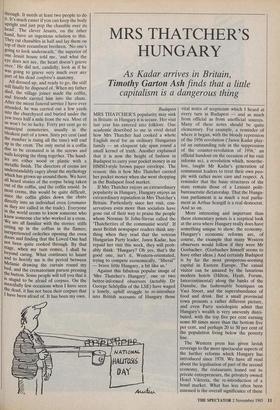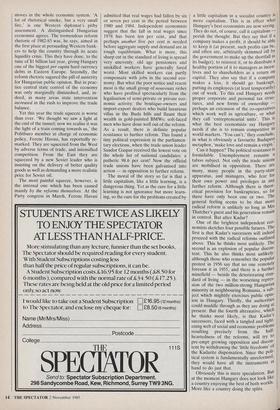MRS THATCHER'S HUNGARY
As Kadar arrives in Britain,
Timothy Garton Ash finds that a little
capitalism is a dangerous thing
Budapest MRS THATCHER'S popularity may sink in Britain: in Hungary it is secure. Her visit last year has entered into folklore. One academic described to me in vivid detail how Mrs Thatcher had cooked a whole English meal for an ordinary Hungarian family — an eloquent tale spun round a small kernel of truth. Another explained that it is now the height of fashion in Budapest to carry your pocket money in an HMSO-style brown paper envelope. The reason: this is how Mrs Thatcher carried her pocket money when she went shopping in the Budapest food market.
If Mrs Thatcher enjoys an extraordinary popularity in Hungary, Hungary enjoys an extraordinary reputation in Mrs Thatcher's Britain. Particularly since her visit, con- servatives even more than socialists have gone out of their way to praise the people whom Norman St John-Stevas called the `Thatcherites of the communist world'. If most British newspaper readers think any- thing when they read that' the veteran Hungarian Party leader, Janos Kadar, has repaid her visit this week, they will prob- ably think: 'Hungary? Oh yes, that's the good one, isn't it, Western-orientated, trying to compete economically, "liberal" — brave little Hungary, a bit like us.'
Against this fabulous popular image of `Mrs Thatcher's Hungary', one or two better-informed observers (notably Dr George SchOpflin of the LSE) have waged a lonely, uphill struggle to re-introduce into British accounts of Hungary those vital notes of scepticism which I heard at every turn in Budapest — and as much from official as from unofficial sources. Many of these notes should be quite elementary. For example, a reminder of where it began, with the bloody repression of the 1956 revolution ('Janos Kadar play- ed an outstanding role in the suppression of the counter-revolution of 1956,' an official handout on the occasion of his visit informs us), a revolution which, nonethe- less, taught Mr Kadar's generation of communist leaders to treat their own peo- ple with rather more care and respect. A reminder that the basic structures of the state remain those of a Leninist polit- bureaucratic dictatorship. That the Hunga- rian parliament is as much a real parlia- ment as Arthur Scargill is a real democrat. And so on.
More interesting and important than these elementary points is a sceptical look at the area where Hungary really does have something unique to show: the economy. Hungary's economic reforms are, of course, the example that many Western observers would follow if they were Mr Gorbachev. (Gorbachev himself seems to have other ideas.) And certainly Budapest is by far the most prosperous-seeming capital in Eastern Europe. The casual visitor can be amazed by the luxurious modern hotels (Hilton, Hyatt, Forum, Intercontinental) along the banks of the Danube, the fashionable boutiques on Vaci Street, and the superabundance of food and drink. But a small provincial town presents a rather different picture, and even Party sociologists admit that Hungary's wealth is very unevenly distri- buted, with the top five per cent earning some 80 times more than the bottom five per cent, and perhaps 20 to 30 per cent of the population living below the poverty line.
The Western press has given lavish coverage to the more spectacular aspects of the further reforms which Hungary has introduced since 1978. We have all read about the legalisation of part of the second economy, the restaurants leased out to private entrepreneurs, the privately owned Hotel Viktoria, the re-introduction of a bond market. What has less often been assessed is the overall significance of these moves in the whole economic system. 'A lot of rhetorical smoke, but a very small fire,' is one Western diplomat's pithy assessment. A distinguished Hungarian economist agrees. The tremendous reform rhetoric of 1982-83 was, he says, aimed in the first place at persuading Western bank- ers to help the country through its acute liquidity crisis. This they have done, to the tune of $1 billion last year, giving Hungary one of the biggest per capita hard currency debts in Eastern Europe. Secondly, the reform rhetoric sugared the pill of austerity for Hungarian public opinion. But in prac- tice central state control of the economy was only marginally diminished, and, in- deed, in many areas state intervention increased in the rush to improve the trade balance.
Yet this year the trade squeeze is worse than ever. 'We thought we saw a light at the end of the tunnel; now we realise it was the light of a train coming towards us,' the Politburo member in charge of economic policy, Ferenc Havasi, has reportedly re- marked. They are squeezed from the West by adverse terms of trade, and intensified competition. From the East they are squeezed by a new Soviet leader who is insisting on the delivery of better quality goods as well as demanding a more realistic price for Soviet oil.
The most painful squeeze, however, is the internal one which has been caused mainly by the reforms themselves. At the Party congress in March, Ferenc Havasi admitted that real wages had fallen by six or seven per cent in the period between 1980 and 1984. Independent economists suggest that the fall in real wages since 1978 has been ten per cent, and that perhaps another five per cent is needed before aggregate supply and demand are in rough equilibrium. What is more, this sharp cut in the standard of living is spread very unevenly: old age pensioners and unskilled workers have generally fared worst. Most skilled workers can partly compensate with jobs in the second eco- nomy. But what the poor notice and resent most is the small group of nouveaux riches who have profited spectacularly from the legalisation of semi-private or private eco- nomic activity: the boutique-owners and import-export dealers who build luxurious villas in the Buda hills and flaunt their wealth in gold-painted BMWs: soft-faced men who have done well out of the reform. As a result, there is definite popular resistance to further reform. This found a tiny political expression in the parliamen- tary elections, when the trade union leader Sandor Gaspar received the lowest vote on the whole list of national candidates: a pathetic 98.6 per cent! Now the official trade unions have been galvanised into action — in opposition to further reform.
The moral of the story so far is that a little capitalism, like a little learning, is a dangerous thing. Yet as the cure for a little learning is not ignorance but more learn- ing, so the cure for the problems created by
a little capitalism in a socialist country is more capitalism. This is in effect what Hungary's best economists are now saying. They do not, of course, call it capitalism perish the thought. But they say that if a company makes a profit, it should be able to keep it (at present, such profits can be. and often are, arbitrarily skimmed off by the government to make up the shortfall in its budget), to reinvest it, or to distribute a healthy portion of it to managers as incen- tives and to shareholders as a return on capital. They also say that if a company makes a loss, it should go bankrupt, putting its employees (at least temporarily) out of work. To this end Hungary needs proper corporate and personal tax struc- tures, and new forms of ownership — perhaps an extension of the co-operatives which work well in agriculture, or what they call 'entrepreneurial units'. This is what the best economists say HungarY needs if she is to remain competitive in world markets. 'You can't,' they conclude, in what is obviously a favourite Budapest, metaphor, 'make love and remain a virgin: Can it happen? The political resistance is formidable. Unemployment remains a taboo subject. Not only the trade unions are mobilised in opposition. There are many, many people in the party-state apparatus, and managers, who fear for their own power and privileges in any further reform. Although there is theor- etical provision for bankruptcies, so far there have only been one or two. The general feeling seems to be that more radical reform is unlikely so long as Mrs Thatcher's guest and his generation remain in control. But after Kadar?
One of the brightest independent eco- nomists sketches four possible futures. The first is that Kadar's successors will indeed proceed with the radical reforms outlined above. This he thinks most unlikely. The second is an explosion of popular discon- tent. This he also thinks most unlikely: although those who remember the popular protest in 1956 say that no one remotely foresaw it in 1955, and there is a further minefield — beside the deteriorating stan- dard of living — in the worsening repres- sion of the two million-strong Hungarian minority in neighbouring Romania, a sub- ject which mightily exercises public opin- ion in Hungary. Thirdly, the authorities could muddle through as they are doing at present. But the fourth alternative, which he thinks most likely, is that Kadar's successors, faced with a tangled and tight- ening web of social and economic problems resulting precisely from the half- heartedness of the reforms, will try to pre-empt growing opposition and discon- tent by withdrawing the 'little freedoms' of the Kadarite dispensation. Since the poli- tical system is fundamentally unreformed, they would have all the instruments at hand to do just that. Obviously this is mere speculation. But at the moment Hungary does not look like a country enjoying the best of both worlds. More like a country doing the splits.























































 Previous page
Previous page